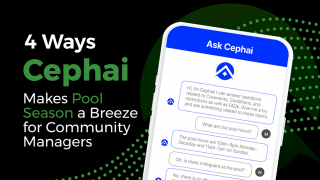- September 6, 2020
- CINC Systems

Board meetings are the backbone of any homeowners association (HOA). At a board meeting, members discuss the current state of the association as well as budgets, proposals for new projects and improvements, and changes to the community’s rules. HOA board meetings offer an opportunity for residents to speak up and advocate for their needs as well. In other words, board meetings are vital to the HOA’s governance.
Many HOAs require a minimum number for attendance to hold a board meeting. Ideally, this encourages everyone in the community to attend a meeting, but there are always residents who cannot be present for various reasons. As a result, the association’s secretary or another designated individual needs to be present to take minutes.
If you’re ever called upon to document an association board meeting, it helps to understand what is involved with taking minutes — this makes it easier to stay organized and record the session with accuracy.
Why Do HOA Minutes Matter?
HOA meeting minutes are vital for several reasons. As mentioned above, they provide a record for anyone who can’t attend the HOA’s board meeting. But minutes are also valuable for the following reasons:
Minutes Serve as a Detailed Business Record
Minutes record valuable details about the HOA’s business. This information is useful for project planning, operations, budgeting, and more. For example, if the HOA voted to paint a building a specific color, this information will be recorded in the minutes. In case the project manager forgets this smaller detail, he or she can consult the minutes.
Minutes can also provide a guide for future meetings. For example, if the board members ran out of time to resolve specific business, they’ll see this in the minutes and remember to raise the topic again at the next meeting.
Minutes Hold People Accountable
Meeting minutes hold residents accountable by creating an official record. For example, if a resident was issued a verbal warning about a rule violation, including this information in the minutes creates an official document trail that will be useful if the resident continues their behavior.
Minutes Create Historical Record
Minutes also serve as a valuable historical record for future HOA leadership. They show how the HOA has changed over time. Board members and managers can consult minutes from the past to see how the HOA’s governance may have changed over time, thereby learning from mistakes or using past successes to affirm current best practices.
Are Minutes Required?
For almost all HOAs, board meetings legally require minute taking. The association’s governing bylaws, as well as state regulations, may require the practice. However, minutes are only required to be taken at official meetings with the minimum member attendance or member proxies. This minimum number is known as a “quorum.”
When there is no quorum, the HOA cannot hold a vote, and the meeting is considered unofficial. HOAs are not allowed to discuss official business in these situations, and therefore minutes do not need to be recorded. Instead, the board secretary should record that there was no quorum and that the meeting has been postponed or canceled.
What to Include in HOA Minutes
Now that you understand why they matter, it’s time to learn what to include in HOA minutes. You may even wish to create a template with specific sections for each piece of information to record.
Remember to keep minutes clear and concise. HOA minutes don’t need to be a lengthy essay. In most cases, bullet points will be sufficient. If more extended discussions or debates occur during a meeting, the minutes don’t need to include a detailed play-by-play of who argued for which side, but could, instead, summarize the final decision.
When the board secretary begins taking minutes, he or she should record the following:
- The date, start time, and location of the meeting.
- The total number of members in attendance. Include the names of board members and residents and be sure to include the names of members voting by proxy.
- The meeting’s agenda. This element should include a brief overview of the topics discussed at the meeting.
- News or updates presented by the board. Remember to keep this section short, but include relevant information about budgets, construction progress, and so on.
- Ballot proposals. This section includes the ballot author’s name, the exact wording of the measure, and the outcome of the vote (whether the motion has passed or not).
- Issues raised by members of the community. Again, this doesn’t need to be overly detailed.
- A list of tabled topics. If the board cannot reach a consensus or runs out of time to vote on a particular proposal, record this information so the committee can move the vote to the next meeting.
- The end time of the meeting.
As a general rule, try to keep minutes under two pages. Only include details pertinent to the proceedings. Members should be able to quickly scan the minutes to understand what occurred during the meeting.
Use CINC Systems to Post HOA Minutes Online
After the meeting has concluded, email the minutes to board members and store a copy in the HOA’s office. Many HOA managers also post association minutes on their website.
CINC Systems offers custom-built, branded websites with personalized email addresses for each association, enabling effective communication between association boards and their communities. Having access to HOA minutes elevates the homeowner experience by increasing transparency and providing community members with instant access to board decisions.
To try CINC Systems association management software for your association management business, click here for a free demo.
Related Reads

Blog
How Priestley Management slashed contact volume in half with Cephai
- July 22, 2024

Blog
Get Ready: Homeowner Associations Must File Under the Corporate Transparency Act
- July 8, 2024

Blog
Generative AI just got a lot more mainstream. Is your community association ready?
- July 1, 2024

Blog
Celebrating Pride Month: CINC Systems Employees Share Inclusivity Wisdom and Advice
- June 28, 2024

Blog
Mid-Year Update: Using the 2024 State of the Industry Report to Drive Business Growth
- June 10, 2024

Blog
4 Ways Cephai Makes Pool Season a Breeze for Community Managers
- May 27, 2024
